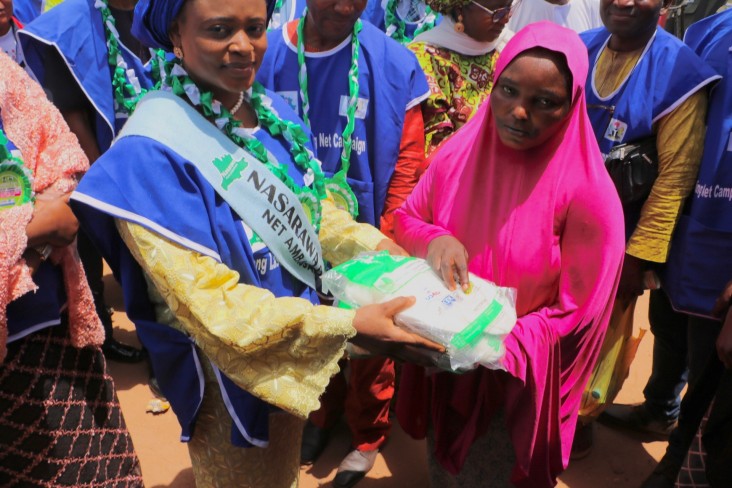Press Release Shim
Speeches Shim

Since 2011, the President's Malaria Initiative has provided 24 million nets for Nigeria
For Immediate Release
Lafia, Nigeria – At a ceremony held March 15, the United States handed over 1.6 million long lasting insecticide treated mosquito nets as part of its comprehensive effort to control malaria across Nigeria.
The donation was made possible through the U.S. President’s Malaria Initiative (PMI) and jointly implemented by the U.S. Agency for International Development (USAID) and the Centers for Disease Control and Prevention (CDC). The bed nets, valued at $4.5 million, will be distributed in all local government areas (LGAs) in the state.
The ceremony was attended by Jummai Ali Agara, wife of the Nasarawa State Deputy Governor who served as the state’s “net ambassador” to advocate for their widespread use; Commissioner for Health Daniel Iya; Hajiya Maryam Balarabe Abdullahi, wife of the Speaker Nasarawa State Assembly; Chairman of the House Committee on Health Muhammed Okpede; and Director Public Health Dr. Ibrahim Adamu.
“In our partnership to fight malaria, we encourage all Nigerians, and especially parents and guardians, to acquire bed nets and use them regularly,” USAID/Nigeria Mission Director Stephen M. Haykin said of the donation. “Bed net use benefits individuals, families and communities.”
To complement the net donation, PMI provided an additional $1 million for logistics, including transportation of the nets, community mobilization, and training of workers charged with their distribution.
Sleeping under an insecticide-treated bed net every night is proven to be the best way to prevent malaria. The nets put a vital barrier between people and the mosquitoes that carry malaria, particularly from dusk to dawn. Malaria is one of the leading killers of children in Nigeria, particularly during the rainy season when the mosquito population increases.
Malaria control is a centerpiece to the USAID health portfolio, which also supports increasing access to health services – especially for the poor. The United States believes investing in the health of the Nigerian people can command great economic returns in terms of work productivity and overall quality of life.
Since 2011, the U.S. government has spent more than $420 million to control malaria in Nigeria including distribution of nearly 24 million mosquito nets. This has resulted in a 36 percent reduction in malaria incidence among children under age five, according to the Malaria Indicator Survey.
More than half of U.S. funding for malaria goes into procuring and distributing insecticide treated bed nets, malaria diagnostic kits, and malaria medicines. The United States also supports advocacy and mobilization to encourage community members to sleep under the bed nets every night, and trains health workers to test for malaria before treatment.

Comment
Make a general inquiry or suggest an improvement.